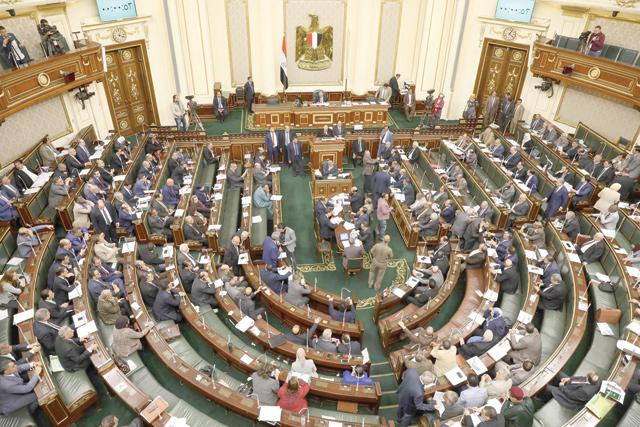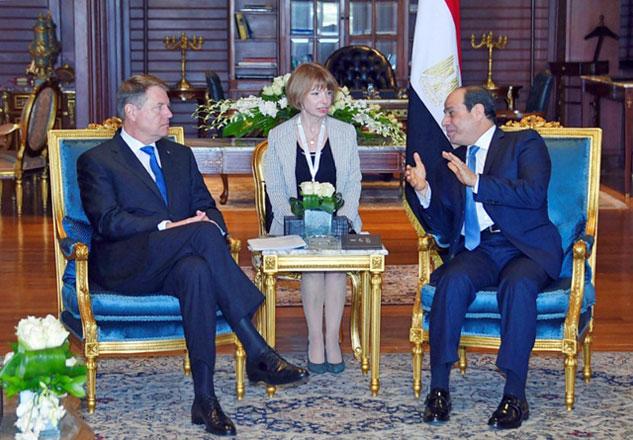You are here
Egypt parliament votes to extend Sisi rule
By AFP - Apr 16,2019 - Last updated at Apr 16,2019

Egypt's members of parliament attend a session in Cairo on Tuesday (AFP photo)
CAIRO — Egypt's parliament on Tuesday approved constitutional amendments allowing general-turned-president Abdel Fattah El Sisi to stay in power until 2030, state media reported.
Deputies also backed other sweeping changes to the constitution including to give the military greater influence in political life as well as granting Sisi more control over the judiciary.
The amendments are expected to be put to a public referendum later this month.
"The president's current term shall expire at the end of six years from the date of his election as president in 2018," reported the official Al-Ahram news website and broadcaster Nile TV.
"He can be reelected for another [six-year] term."
Sisi led the army's overthrow of elected president Mohamed Morsi in 2013 following mass protests against the Islamist leader's rule.
He won his first term as president in 2014 and was reelected in March 2018 with more than 97 per cent of the vote, after standing virtually unopposed.
His government has been widely criticised by human rights groups for the repression of political opponents.
But Mohamed Abu Hamed, a member of parliament who pushed for the constitutional amendments to keep Sisi in power, was adamant the changes were needed to allow him to complete political and economic reforms.
"The constitution in 2014 was written under tough exceptional circumstances," he told AFP.
The deputy hailed Sisi as a president who "took important political, economic and security measures... [and] must continue with his reforms", in the face of the unrest gripping neighbouring countries.
'Will of the people'
The vote comes after two veteran presidents were ousted in Algeria and Sudan and amid an escalation of the conflict in Libya.
Keeping Sisi in power, he added, reflected “the will of the people”.
State-run Al Ahram news website said several MPs carried Egyptian flags as they gathered for the vote inside the parliament while nationalistic songs played in the background.
The amendments were initially introduced in February by a parliamentary bloc supportive of Sisi and updated this week after several rounds of debates.
Prior to the amendments, Egypt’s 2014 constitution stipulated only two four-year presidential terms.
The 596-seat parliament, which is dominated by Sisi loyalists, was elected in 2015, about a year after Sisi took office.
Since Sisi overthrew Morsi, Egypt has drawn heavy international criticism for its sweeping crackdown on dissent.
The authorities have jailed thousands of Morsi’s supporters as well as liberal and secular activists, including a popular blogger, actors, singers and journalists.
As lawmakers debated the proposed changes, prominent dissident actors Khaled Abol Naga and Amr Waked denounced them as a power grab.
If passed, “these amendments would take us back to a dictatorship fit for the Middle Ages,” Waked told a news conference by rights groups in Geneva.
His fellow actor criticised Sisi’s narrative that his rule brought stability.
“Where is there stability in a country that jails children... that treats people badly or that kills?” he said.
Human Rights Watch (HRW) has said the amendments would “institutionalise authoritarianism”.
When Sisi visited Washington for talks with US President Donald Trump last week, HRW urged Congress to withhold endorsement of his bid to extend his rule.
“Congress needs to use its levers to pressure the Egyptian president to reverse course, starting with withdrawing these constitutional amendments set to consolidate authoritarian rule,” said HRW’s Michael Page.
Amnesty International has warned the constitutional amendments “would worsen the devastating human rights crisis Egyptians are already facing”.
“They would grant President Abdel Fattah Al Sisi and security forces free rein to further abuse their powers and suppress peaceful dissent for years to come,” said Amnesty’s Magdalena Mughrabi.
Other constitutional amendments include a quota for women’s representation of no less than 25 per cent in parliament and forming a second parliamentary chamber.
Related Articles
CAIRO — Egypt's parliament is debating proposed constitutional changes that could allow President Abdel Fattah Al Sisi to stay in power
CAIRO — Egyptian President Abdel Fattah Sisi warned on Sunday against the dangers of protesting, in the wake of widespread demonstrations in
CAIRO — Egypt’s actors union said on Wednesday it was expelling two prominent performers after they criticised constitutional amendmen
















